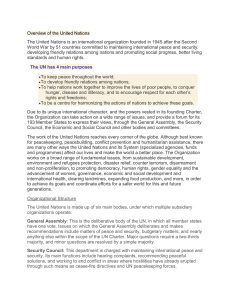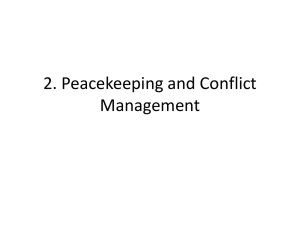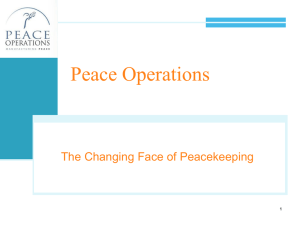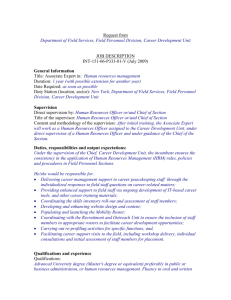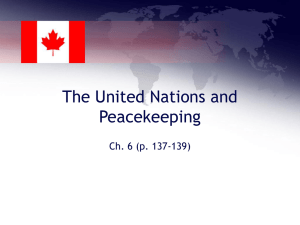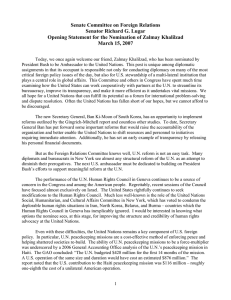GAO U.N. PEACEKEEPING Access to Records Concerning the U.S.
advertisement
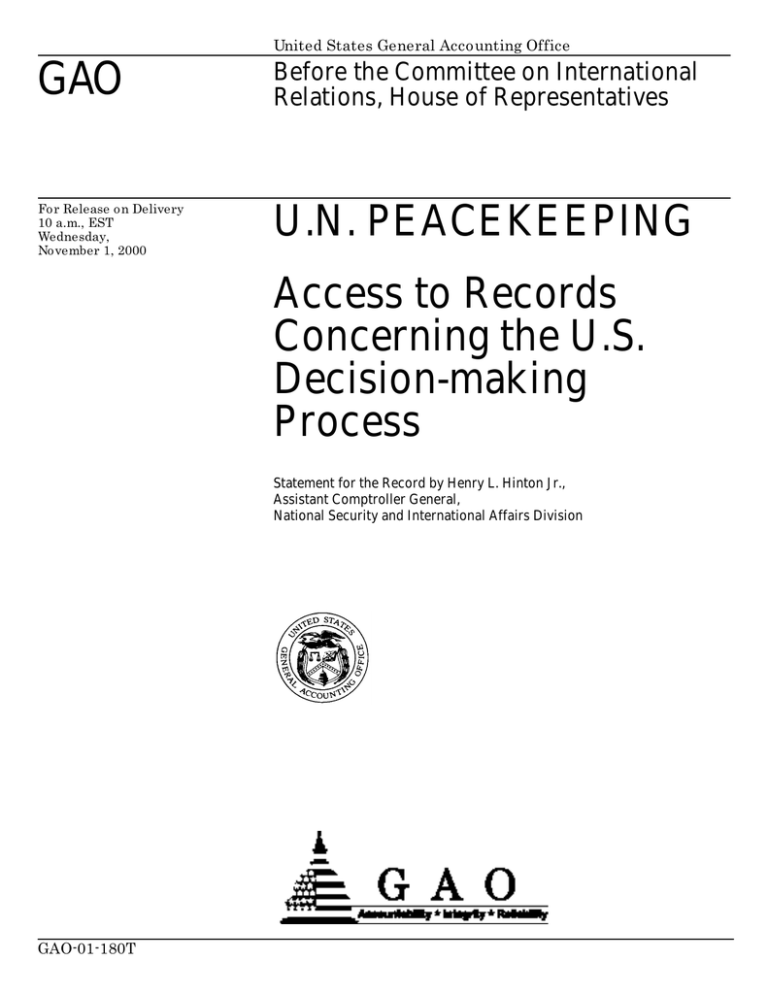
United States General Accounting Office GAO Before the Committee on International Relations, House of Representatives For Release on Delivery 10 a.m., EST Wednesday, November 1, 2000 U.N. PEACEKEEPING Access to Records Concerning the U.S. Decision-making Process Statement for the Record by Henry L. Hinton Jr., Assistant Comptroller General, National Security and International Affairs Division GAO-01-180T Mr. Chairman: I am here today to discuss the access to records we need to conduct the study that you requested concerning the administration’s process for approving U.N. peacekeeping operations. Our study is focused on decisions made between January 1999 and June 2000 to support operations in Kosovo, East Timor, Sierra Leone, and the Democratic Republic of the Congo. To complete this study, we need two types of access from the State and Defense Departments and the National Security Council (NSC). First, we need full and complete access to all records at these agencies that are considered to be relevant to our study. This includes access to 26 documents relevant to our review identified by the State Department and controlled by the NSC. (See the appendix for a list of the 26 documents.) We reviewed copies of these documents at the NSC on Thursday, October 26, but they were so heavily redacted that they provided little useful information. One 20-page unclassified document had a note on its cover page that said its contents could be shared with U.S. allies and the United Nations, yet the remainder of the document was completely redacted, its pages completely “blacked out.” These 26 documents represent 44 percent of the 59 sensitive records that State has identified over 7 months in response to our requests—and most have been stripped of all useful information. This is clearly inappropriate and unacceptable. Our need for full and complete access to all records relevant to our study also includes access to additional records needed to fill in “gaps” in the information that the State Department has provided. For example, State identified only one document as relevant to our study in the 4 months prior to a key US vote in the UN Security Council on East Timor. During this 4-month period, the Department worked with UN officials to develop and refine—and brief congressional staff about—the proposed U.N. operation’s concept and mandate. Yet, State has not provided us records showing how decision-makers applied Presidential Decision Directive 25 during this period. We believe it is likely that such records exist—and we need timely access to them. We cannot afford to wait additional months for access to these records. Moreover, our need for full and complete access to records includes access to records at the Defense Department. We wrote the Department on March 23 and again on April 13 to request its cooperation in arranging access to relevant records. Because State has lead responsibilities on the process for approving U.N. peacekeeping operations, Defense officials declined to meet 1 with us to discuss our study until State had resolved how it would handle our access to records. It was not until September 15 that Defense officials agreed to begin searching to identify relevant records. We understand Defense plans to complete this search by Monday, November 6. However, Defense officials did not know when or if we could have access to any of the records. In our view, such an extensive delay in providing us information cannot be justified. Second, we need independent access to State, Defense, and NSC records for the U.N. peacekeeping operations covered by this study. We need independent access to assure ourselves that we are able to review all records and information that have a material bearing on our study. Auditing standards meant to assure the independence of our work state that external interference that limits or modifies the scope of our audit—or interferes with the selection of information we examine—threatens our ability to form independent and objective opinions and conclusions.1 I should note that our independence is one of the qualities that Congress values most about GAO’s work. However, we believe the process employed by State and Defense threatens our independent access to records as well as the quality and validity of our study—and ultimately its usefulness to this committee and Congress as a whole. State Department used the following process to respond to our requests for information to conduct this study: it tasked various bureaus, offices, and other locations to identify potentially relevant documents and forward them to the Bureau of International Organizational Affairs. Bureau officials then reviewed the collected documents and forwarded most of them to the NSC to obtain its clearance to release them to GAO. The Defense Department is following a similar process. In our view the existing process is unacceptable and must be changed. First, the current process gives executive branch officials exclusive control to determine what records are relevant to this study. The State Department is the subject of this review and therefore its officials cannot be independent and objective. Additionally, State and Defense officials have told us that searching for records for this study has placed a considerable burden on already over-worked bureau, office, and embassy staffs. As such, we cannot be assured 1 Government Auditing Standards (1994 Revision, Comptroller General of the United States, June 1994). The publication discusses general standards for conducting audits, such as qualifications of the staff and independence of the work. “These standards, often referred to as generally accepted government auditing standards (GAGAS), are to be followed by auditors and audit organizations when required by law, regulation, agreement, contract, or policy.” 2 that these searches were as thorough and exhaustive as our standards and policies require. A combination of these factors may explain the gaps in the information I discussed before. Moreover, relying completely on the Departments to identify records makes timely completion of our study conditional on their ability to mobilize adequate staff resources. As I stated before, this is clearly unacceptable. Second, we have specific concerns about how the executive branch has dealt with our requests for information for this study. In two cases, for example, State officials failed to make us aware of records directly and significantly relevant to our study. In both cases, State officials said they did not identify these records—such as five Directive 25 analyses—because we did not specifically request them by name. Yet in both cases, we made clear in our discussions and prior letters that these documents contained the type of information we sought to complete our study. Additionally, the extensive redaction of the 26 documents controlled by NSC raises questions about (1) whether the executive branch is actually making efforts to provide us the information needed to complete this study and (2) whether these records may contain references to other, as yet unidentified, records that might be relevant to our work. I should note that we discovered the existence of the Directive 25 analyses as a result of references made to them in documents that State initially withheld from us. Mr. Chairman, we intend to take action to obtain access to the records we believe are essential to completing the study you requested. Specifically, we seek (1) full and complete access to unredacted copies of the 26 documents identified by the State Department and controlled by the NSC; and (2) sufficiently independent access to State, Defense, and NSC records to assure ourselves that we have identified all the information that has a material bearing on our study. If we do not receive such access within a week—by noon, Thursday, November 9—the Comptroller General of the United States intends to issue a formal demand letter to the Department of State, the Department of Defense, and the National Security Council. This concludes my statement for the record. I am happy to answer any questions you or the Committee may have at this time. 3 APPENDIX TWENTY-SIX DOCUMENTS CONTROLLED AND REDACTED BY THE NSC Documents Concerning U.S. Decisions to Support U.N. Operations in East Timor 1. Notes, State Department Peacekeeping Small Group meeting, May 4, 1999 2. Agenda and discussion paper, Peacekeeping Core Group meeting, May 11, 1999 3. Agenda and discussion paper, Peacekeeping Core Group meeting, May 24, 1999 4. State Department briefing memorandum, Deputies Committee meeting, May 27, 1999 5. Announcement and discussion paper, Deputies Committee meeting, May 27, 1999 6. Agenda and discussion paper, Peacekeeping Core Group meeting, July 29, 1999 7. Summary of conclusions, Peacekeeping Core Group meeting, August 11, 1999 8. Peacekeeping Core Group memorandum, August 26, 1999 9. State Department briefing memorandum, Deputies Committee meeting, August 31, 1999 10. Agenda and discussion paper, Deputies Committee meeting, August 31, 1999 11. Concept paper, September 1, 1999 12. State Department action memorandum, September 2, 1999 13. State Department action memorandum, September 2, 1999 14. Options paper, September 6, 1999 15. US Mission to the United Nations e-mail, October 8, 1999 16. State Department briefing memorandum, Deputies Committee meeting, October 12, 1999 17. State Department briefing memorandum, Deputies Committee meeting, October 21, 1999 18. Discussion paper, Deputies Committee meeting, October 21, 1999 Documents Concerning U.S. Decisions to Support U.N. Operations in the Democratic Republic of the Congo 19. Summary of conclusions, Peacekeeping Core Group meeting, July 21, 1999 20. Summary of conclusions, Peacekeeping Core Group meeting, January 21, 2000 21. Agenda and discussion paper, Deputies Committee meeting, January 26, 2000 Documents Concerning U.S. Decisions to Support U.N. Operations in Sierra Leone 22. Summary of conclusions, Peacekeeping Core Group meeting, August 15, 1999 23. Discussion paper, Peacekeeping Core Group meeting, September 29, 1999 24. Summary of conclusions, Peacekeeping Core Group meeting, September 29, 1999 4 25. Discussion paper, Peacekeeping Core Group meeting, January 8, 2000 26. State Department action memorandum, January 18, 2000 (320000) 5
